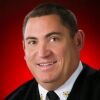While in Atlanta at the 2011 Fire-Rescue International, I had the opportunity to conduct several podcasts from the Columbia Southern University booth on the show floor for my show, “Stop Drop and Roll With the Punches” on www.firefighternetcast.com.
One particular episode that I recorded was with my close friends and mentors, Richard Marinucci, Fire Chief of Northville Township, Mich., and Dennis Rubin, former Fire Chief for the District of Columbia Fire and EMS Department. Our topic was the political process and how it affects prevention.
I posted the link to the show on my Facebook page and another pal of mine, South Carolina Advocate Jon Marsh, suggested that we should expand this topic to include the political connection to the 16 Life Safety Initiatives (LSI).
What a novel idea! We deal with politics in our jobs every single day in some form or some fashion. Who would have thought that firefighter safety wasn’t a political issue? Been there and done that!
A few years ago when I was a fire chief at a small career department just south of Atlanta called Riverdale, I was making a presentation on staffing and equipment needs in a council meeting.
As I stood at the podium in front of the honorable Mayor and Council, I was attesting as to why I needed supplemental staffing in conjunction with the purchase of an additional apparatus to the fleet.
One particular councilmember addressed me in the fashion, “Oh Chief Hayes, here you go again, telling us how everything is about firefighter safety!”
Taken aback by the comment, but with a sudden response before a full house and a teachable moment, I responded, “Councilmember, while you would expect for me to stand before you and all of those behind me in attendance to say that the public’s safety is my number one concern, I am here to tell you that my number one responsibility is the safety of my employees. Without their safety and well-being, how can I protect those sitting behind me?”
Before I could continue with the presentation, I had to pause due to the surprising applause coming from the citizens and visitors of those attending the council meeting.
Certainly I meant no disrespect to any of the elected officials with my remark, but at that moment in time I had to say what needed to be said in front of the audience that needed to hear it.
Sometimes as leaders, that is what we must do when entrusted in a position of leadership. I, of course, further explained what I meant so that everyone had a clear understanding of my commitment to the department and community.
Fire Chiefs must engage the public and their elected officials beyond just council meetings. It is a never-ending process of education that we must deliver. If you can recall how engaged the public and elected officials were in the weeks and months following September 11, 2001, we could get and do just about anything we wanted.
It wasn’t because we had necessarily educated them, it was the sentiment of the event. Perhaps due to our failure to continue the education process at the local level and with the public, we find ourselves approaching this 10-year anniversary in a completely different situation.
But let’s don’t lay it all on the Chief’s desk. Firefighters at every level within the organization must also be engaged in the process. Why? Who are the 16 Life Safety Initiatives for? They are for the fire service, but specifically those emergency responders who are on the street every day.
Do firefighters have an interest in Initiative 6 as it relates to health and wellness? Of course! Do firefighters have an interest in Initiative 13 as itrelates to mental health support? Of course! Do firefighters have an interest in the safety designs of emergency apparatus as expressed in Initiative 16? Of course!
In each of these examples, as well as with some of the other Initiatives, there is often a price tag attached. There is also a political component by those who are elected and we have every responsibility to educate them.
Not just the Fire Chief, not just the firefighters, but all of us together as a fire and emergency services. Changing a culture in a fire department will also need the support of those elected above.
Because our department was small, and I also wanted our employees to understand the political process, I had them attend council meetings while they were on duty. They come to understand and appreciate the challenges I faced as the Fire Chief.
Keep in mind, which is especially true at the smaller local governments, that the elected officials come out of the general public, and in many cases have no previous experience in politics.
I’ve experienced individuals at the opposite end of the spectrums in my career. In Riverdale, I worked for some who had little to no experience; therefore I spent a great deal of time explaining needs, while in DC the council were professional politicians and the interaction between Chief Rubin and the council was limited.
Develop a training program to help your elected officials understand your organization, your mission, and more importantly your value to the community. Not just on 9/11, but every single day.
The 16 Life Safety Initiatives have been out since 2004. I hope that on the 10-year anniversary, they conduct another summit to evaluate what’s working and what’s not working, but more specifically add another initiative that addresses how the political process affects firefighter safety.
My thoughts are with all of the emergency responders and their families affected by 9/11 in New York, Pennsylvania, Washington DC and Virginia.
Be proud that you, and every responder across this country are the true Homeland Security!












